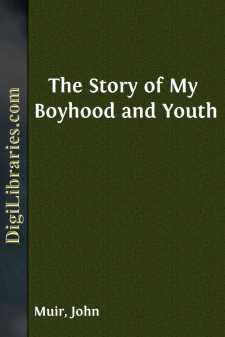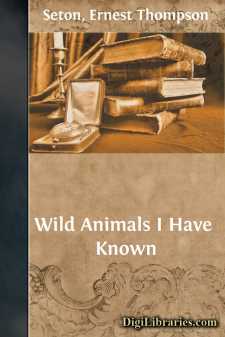Biography & Autobiography
- Adventurers & Explorers 15
- Artists, Architects, Photographers 16
- Business 2
- Composers & Musicians 14
- Criminals & Outlaws 5
- Editors, Journalists, Publishers 6
- Educators 1
- Entertainment & Performing Arts 3
- General 74
- Health, Exercise & Fitness 1
- Historians 3
- Historical 83
- Law Enforcement 1
- Lawyers & Judges 3
- Literary 147
- Medical 7
- Military 48
- Naturalists, Gardeners, Environmentalists
- Personal Memoirs & Diaries 227
- Philosophers 3
- Political 9
- Presidents & Heads of State 38
- Religious 38
- Rich & Famous 27
- Scientists 13
- Women 31
Naturalists, Gardeners, Environmentalists Books
Sort by:
by:
John Muir
I A BOYHOOD IN SCOTLAND Earliest Recollections—The "Dandy Doctor" Terror—Deeds of Daring—The Savagery of Boys—School and Fighting—Birds'-nesting. When I was a boy in Scotland I was fond of everything that was wild, and all my life I've been growing fonder and fonder of wild places and wild creatures. Fortunately around my native town of Dunbar, by the stormy North Sea, there...
more...
by:
Charles Darwin
CAMBRIDGE 1828-1831. After having spent two sessions in Edinburgh, my father perceived, or he heard from my sisters, that I did not like the thought of being a physician, so he proposed that I should become a clergyman. He was very properly vehement against my turning into an idle sporting man, which then seemed my probable destination. I asked for some time to consider, as from what little I had heard...
more...
THESE STORIES are true. Although I have left the strict line of historical truth in many places, the animals in this book were all real characters. They lived the lives I have depicted, and showed the stamp of heroism and personality more strongly by far than it has been in the power of my pen to tell. I believe that natural history has lost much by the vague general treatment that is so common. What...
more...
by:
Leonard Huxley
CHAPTER 2.1. 1870. [With the year 1870 comes another turning-point in Huxley's career. From his return to England in 1850 till 1854 he had endured four years of hard struggle, of hope deferred; his reputation as a zoologist had been established before his arrival, and was more than confirmed by his personal energy and power. When at length settled in the professorship at Jermyn Street, he was so...
more...
by:
Leonard Huxley
1887. [The first half of 1887, like that of the preceding year, was chequered by constant returns of ill-health.] "As one gets older," [he writes in a New Year's letter to Sir J. Donnelly, "hopes for oneself get more moderate, and I shall be content if next year is no worse than the last. Blessed are the poor in spirit!" [The good effects of the visit to Arolla had not outlasted...
more...
by:
Leonard Huxley
1825-1842. [In the year 1825 Ealing was as quiet a country village as could be found within a dozen miles of Hyde Park Corner. Here stood a large semi-public school, which had risen to the front rank in numbers and reputation under Dr. Nicholas, of Wadham College, Oxford, who in 1791 became the son-in-law and successor of the previous master. The senior assistant-master in this school was George...
more...
IANTIQUITY I have often been caricatured in Turkish dress seated upon cushions, and surrounded by cats so familiar that they did not hesitate to climb upon my shoulders and even upon my head. The caricature is truth slightly exaggerated, and I must own that all my life I have been as fond of animals in general and of cats in particular as any brahmin or old maid. The great Byron always trotted a...
more...
PREFACE Although it is now a century since Lamarck published the germs of his theory, it is perhaps only within the past fifty years that the scientific world and the general public have become familiar with the name of Lamarck and of Lamarckism. The rise and rehabilitation of the Lamarckian theory of organic evolution, so that it has become a rival of Darwinism; the prevalence of these views in the...
more...









